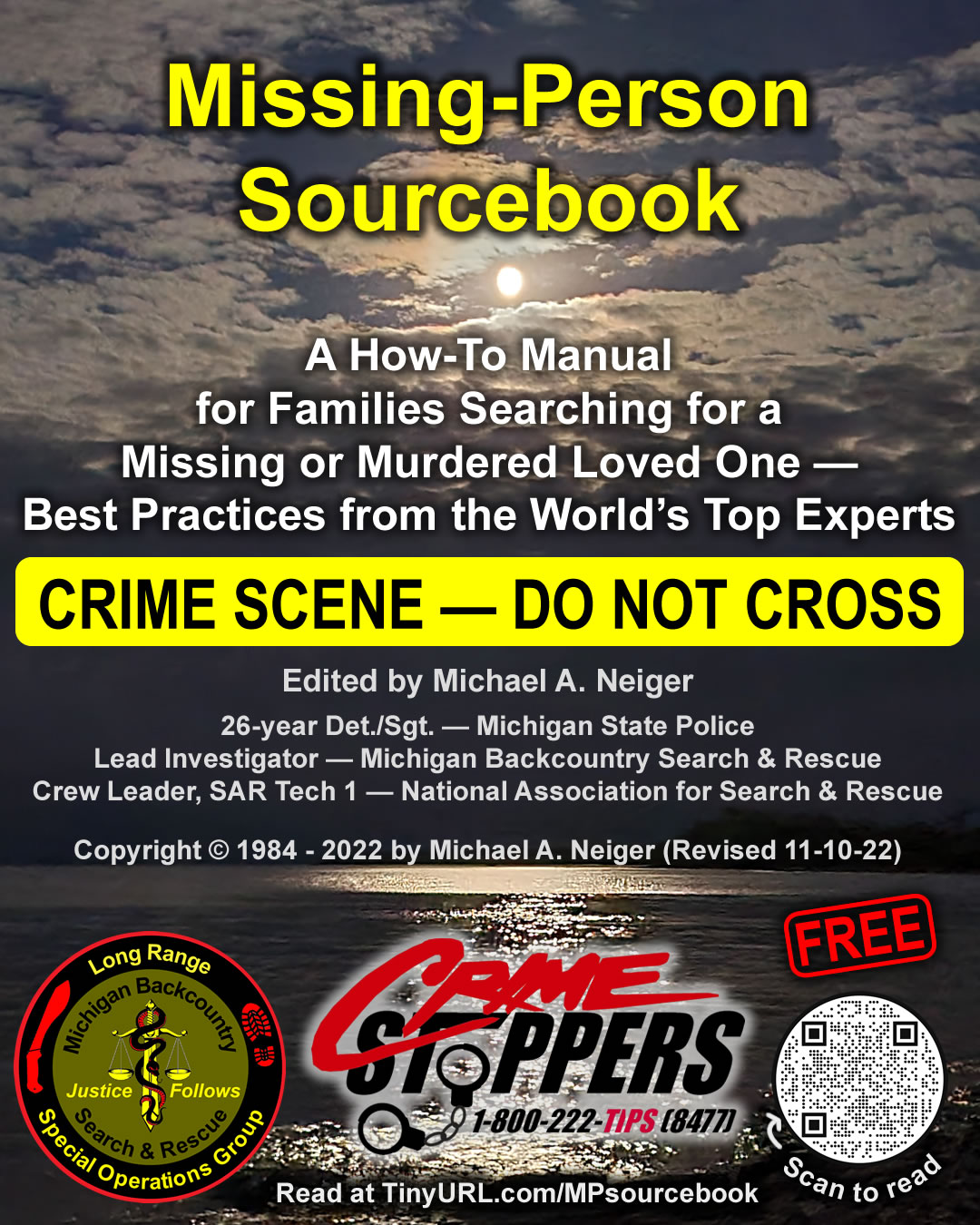
You're here: MibSAR :: M-P Sourcebook Table of Contents :: Media
How to Use the Media to Build Awareness of Your Loved One's Case
| << Prior Chapter | Next Chapter >> |
These books and resources can help families leverage the media to the benefit of their loved one's case.
Page contents:
- When Your Child Is Missing: A Family Survival Guide, by the Office of Juvenile Justice and Delinquency Prevention (OJJDP), (NCJ 228735) Fourth edition, 2010, 114 pages.
- Long-Term Missing Child Guide for Law Enforcement: Strategies for Finding Long-Term Missing Children, edited by Robert G. Lowery, Jr., and Robert Hoever, National Center for Missing & Exploited Children (NCMEC), 2016, 226 pages.
- Community Resource Guide: What Can I Do to Help the Families of Missing and Murdered Aboriginal Women and Girls?, by the Native Women's Association of Canada (NWAC), 2010, 81 pages.
- If The Media Calls: A Guide for Crime Victims & Survivors, by the Canadian Resource Centre for Victims of Crime, Ottawa, Ontario, Canada, 2016, 16 pages.
- The SOS Guide: Missing Persons — A Guide for the Families and Friends of Missing Persons, by the National Missing Persons Coordination Centre (NMPCC), Australian Federal Police (AFP), 2017, 34 pages.
- Missing Persons Cases: Proactive Media Guide, by the National Missing Persons Coordination Centre (NMPCC), Australian Federal Police (AFP), 2017, 2 pages.
- Families of Missing Adults: Finding Help, by Ontario's Missing Adults (OMA), Department of Justice Canada (DOJC), 2015, 22 pages.
- The Laura Recovery Center Manual, by the Laura Recovery Center (LRC) Team, 2002, 84 pages.
- Missing: A Guide for Families and Friends of Individuals with a Mental Illness Who Have Gone Missing, by Christine Lafond, Stephanie Scherbain & Gita Sud, Mental Health Education Resource Centre of Manitoba, Canada, 2006, 36 pages.
- The Disappearance of an Adult in Criminal Circumstances: A Guide Intended for Relatives and Interveners, by Justine Razafindramboa, Association des familles de personnes assassinées ou disparues, (AFPAD), Quebec, Department of Justice, Canada, 2017, 32 pages.
- Someone is Missing: Can the Media Help You?, by Families and Friends of Missing Persons Unit, Victims Services, New South Wales, Department of Justice, Australia, 2001, 2 pages.
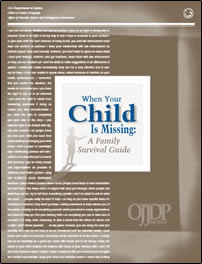 |
|
| When Your Child Is Missing: A Family Survival Guide, by the Office of Juvenile Justice and Delinquency Prevention (OJJDP) | |
The Media
The media can be important allies in the search for your missing child.
But media interest in your case may be either intense or lukewarm, depending on the circumstances surrounding the disappearance of your child and the media’s judgment of what is newsworthy.
One shot on the evening news is worth 20,000 posters. — Patrick Sessions, father of Tiffany Sessions, who has been missing since
February 9, 1989.
If you are subjected to intensive media cover-age, welcome the attention, even though it may feel uncomfortable, because it is the fastest and most important way to distribute information about and pictures of your child.
If you find yourself feeling overwhelmed by the amount of attention, ask law enforcement to help you deal with the sudden barrage of reporters and requests for interviews.
However, if the media do not take an interest in your case, there are a number of things you can do to get the media involved. This chapter offers suggestions for generating, maintaining, and managing media involvement.
Media Involvement: The First 48 Hours
During the first 48 hours, you need to do as much as you can to generate media interest in the search for your child. The following tips can help.
- Contact the media immediately.
Media publicity is the best way to generate leads from the public concerning your child. In most cases, the media should be contacted immediately because time is not on your child’s side.
You can ask law enforcement to make the initial calls to media outlets, but if this is not done within the first hour, call and give the information to the assignment editors yourself. Intense, early media coverage ensures that people will be looking for your child.
Some times the coverage is so intense it causes an abductor to let the child go.
- Ask radio and television stations to run short clips about the disappearance or to break into their regular programming with information, as is done with a weather warning or other emergency broadcast.
Don’t wait until the evening news to have information disseminated about your child. Time is of the essence.
- Although television coverage is crucial in getting out pictures and stories of your child, don’t ignore other types of media.
Print and radio media reach tens of thousands of homes each day, and they may be more generous in their treatment of your story. Many people are likely to hear about your child’s disappearance first on their car radios.
Supplement those broadcasts with stories and pictures of your child in the earliest possible edition of your local newspaper.
- Law enforcement may need to be convinced that the media are important allies in a missing child case.
Sometimes law enforcement is reluctant to get the media involved in an active criminal investigation.
If your law enforcement agency is reluctant, you will have to work closely with you primary contact.
Point out that swift use of the media has led to the successful recovery of more than one missing child and that your child’s safety and recovery are more important than building a case against a suspect.
Emphasize that you are going to be around for interrogation as weeks pass, but your child’s life is in imminent jeopardy.
Ask if certain information should not be released because it might jeopardize the case or the safety of your child and honor that request.
As a last resort, ask the National Center for Missing & Exploited Children (NCMEC), your state missing children’s clearing- house, and missing children’s organizations to assist in the event that your law enforcement agency does not want to involve the media.
- Prepare a media package and give it to all representatives of the media.
The media package should include basic information about your child, including:
- A complete description of your child and of the clothing he or she was wearing at the time of the disappearance.
- A description of the place where your child was last seen.
- Current black-and-white, digitized, and color photos.
- A phone number for people to call with possible leads.
- Details of the reward, if one is being offered.
- Other pertinent information that could help in the recovery of your child, such as a suspicious vehicle near the location where your child was last seen.
- Information about any Web sites that are being used to aid in the recovery of your child.
- A complete description of your child and of the clothing he or she was wearing at the time of the disappearance.
A media package will ensure that all reporters start with the same information and will reduce the amount of time you spend answering basic questions.
When you prepare a media package, make enough copies to distribute, then keep the original in a safe place in case you need it again in the future.
- Select someone to function as a media spokesperson if you feel you are not able to speak alone.
Audiences identify with the fear and anguish parents feel when their child is missing. Seeing your face and hearing your voice will motivate viewers to look closer at the picture of your child and to search harder for him or her. Therefore, it is best if you can speak on your child’s behalf.
However, don’t feel you need to be a great speaker. Just talk from your heart and let people know you love your child and need their help in finding and bringing your child home.
Bolster your confidence by having someone you know stand beside you to provide support and step in if necessary.
On the other hand, if you or your spouse feel unable to deal with the media, choose someone you trust to speak for you, and try to stand beside your spokesperson during the interview.
The checklist Conducting Interviews With the Media gives more specific tips on interviews with both print and broadcast journalists.
- Schedule press conferences and interviews around media deadlines.
The media operate on deadlines. If you schedule a press conference either too early or too late in the day, reporters will find it difficult to finish their pieces in time to meet their daily deadlines.
Consult with reporters to find out when and how often they would like to meet with you.
Many parents have found 10 a.m. and 3 p.m. to be good times because they give reporters enough time to prepare stories for both the noon and evening news and because many reporters have openings in their schedule at these times.
Try not to turn down interviews.
- Do not schedule draining interviews or speeches back to back.
Realize that you have limited mental and physical resources and that if you are not fresh, you will not be effective. If you have an opportunity to appear on a popular radio or television show or on a national network, give this engagement priority over others.
However, remember that local television and radio stations will be in your community after the networks leave, so work to develop a long-term relationship with them. Sometimes you can ask local stations to rerun portions of an interview you did with the national affiliate.
- Avoid scheduling press conferences that conflict with an important event.
If you want to make an important announcement, such as a reward offer, make sure you aren’t competing with another scheduled event.
Find out what events are listed in the day book — often kept by Associated Press — which is used by local media to keep track of newsworthy occurrences. Set your press conference for a time when nothing else significant is happening.
- Ask NCMEC or law enforcement to contact America’s Most Wanted on your behalf.
The staff of this television program, which broadcasts nationally, have a special interest in helping to recover abducted children. America’s Most Wanted can be reached by calling 800–CRIMETV (800–274–6388).
- Be aware of your public status.
Although this is not the kind of fame you want, you may attain some sort of “celebrity” standing because of your continuous involvement with the media.
This sudden public status can be very intrusive. People will recognize and approach you wherever you go. The media may turn up at any time and any place, asking for information.
You may be filmed any time you are in a public place — and even through the windows of your own home, if the photographer uses a powerful lens.
Therefore, for your child’s sake, conduct yourself as if all eyes were upon you. Realize that you no longer have the same privacy you once had.
Try not to be paranoid, but be careful. Don’t do things that might cast you in a negative light, but don’t feel guilty if you go out to dinner or to the movies to relieve the stress as the days and weeks pass.
- Review all media stories, comments, and tapes.
Parents, family members, and friends should review all media spots and events in case they contain clues or pieces of information that could help you at a later date.
For example, comments by particular individuals, multiple appearances by one individual, or knowledge of personal or confidential information not previously revealed may help to pinpoint either the perpetrator or persons close to the perpetrator.
- If your child is returned, don’t let him or her review any tapes of the suspect.
This may jeopardize identification of the suspect by your child when a lineup is scheduled by law enforcement.
Setting Ground Rules
In the very beginning, media interest is likely to be both intense and intimidating.
Therefore, it’s important for you to establish ground rules as to where and how often you or your spokesperson will meet with the media.
The following tips can help:
- Schedule specific times and locations so reporters know when and where they will be able to ask questions and obtain information. Remember that you control the situation—the media do not control you.
- Choose a location that is convenient for you but that allows the media the space they need to cover the story.
For example, you may feel most comfortable holding interviews either outside your house or inside one room. That way, you can allow the media to glimpse your child’s personal life without letting them become too invasive.
- Don’t open up your home to the media without restrictions or limitations. If you do, you will lose all privacy, and the presence of reporters could interfere with officers working at the scene.
- Don’t feel that you are personally obligated to provide all interviews or to participate in all media events. Ask law enforcement, your family spokesperson, and other family members to help.
- Remember that you have the ability to set limits in terms of timing, scheduling, and making rules concerning the use of pictures of your other children. Be sure that the media are aware of your rules and that you expect them to be followed.
- If a press conference is scheduled, stick to the message that you want to deliver. You don’t have to answer every question. Repeat what you want people to hear no matter what questions are asked.
Key Points
-
The media should be contacted immediately after your child’s disappearance— either by you or by law enforcement—because media publicity is the best way to generate leads from the public. Time is of the essence.
- If your law enforcement agency is reluctant to involve the media in an active criminal investigation, work closely with your primary contact to convince the agency that media attention has led to the successful recovery of more than one missing child.
- Prepare a package to give to all representatives of the media that includes a complete description of your child and of the clothing he or she was wearing at the time of the disappearance, a description of the place where your child was last seen, a phone number for people to call with leads, details of the reward
(if one is being offered), and current black-and-white, digitized, and color photos.
- Your pleas for help will be most effective if you personally speak to the media
on your child’s behalf, but if you cannot do that, ask someone you trust to stand beside you and step in if necessary or to be your spokesperson.
- Schedule interviews and press conferences around media deadlines, and consult the Associated Press day book to help you avoid scheduling press conferences that conflict with an important news event.
- Devise “media hooks,” such as candlelight vigils or birthday celebrations, to keep your child’s story in front of the public. Parcel out new developments in the case in separate announcements to spread coverage over a longer period of time.
- The media, especially local radio stations, can be an effective tool in asking for help.
- Be aware that you have become a public person and that the media may turn up at any time and any place to ask questions or to capture your activities on film. Although being in the spotlight might feel intrusive, such attention means that people are interested in learning more about your case.
- If you suspect that your child has been abducted, ask NCMEC or law enforcement to contact America’s Most Wanted on your behalf.
- If your child is returned, don’t jeopardize identification of the perpetrator by allowing your child to review tapes of the suspect.
Media Involvement: After the First 48 Hours
At first, you may feel overwhelmed by the intense media interest generated by your child’s disappearance. After a week or so, however, if your child has not been found, you may run into the opposite problem.
If media interest dies down, you will have to work to keep the story going. Here are some things you can do to keep your child’s story in the public eye.
- Devise “media hooks” to keep your child’s story in front of the public.
Schedule a press conference on an important day, such as National Missing Children’s Day (May 25), or prepare a press release to coincide with federal or state legislation relating to missing, exploited, or victimized children.
Remember, you don’t know how long you will have to search for your child, so you need to plan for the long term. Ask a family member or friend to help if you find the task too difficult.
- Give the story a new slant.
To give the story a new look, you may want to change the tone of your interviews. Try bringing in someone new to discuss the case, such as a politician, sports personality, popular entertainer, or someone close to the investigation.
- Pace yourself.
Parcel out new developments in the case in separate announcements to spread coverage over a longer period of time.
Ask law enforcement to notify the press of significant developments, such as important leads or items found during the physical search.
- Keep the story alive by tying it to a variety of events and activities.
You can hold a candlelight vigil, announce a reward, or show how celebrations such as a birthday, holiday, or graduation are different without your child.
You can tie your child’s story to something that will be broadcast repeatedly, such as a popular song on the radio. Then, every time the song plays, it will be a reminder that your child is still missing.
If you can create a way for the media to present your child’s story in a different way, it is more likely to be run. Remember that media attention increases when you hold special events and when anniversaries come up.
Also, remember to coordinate all events and activities with law enforcement because they can be an important part of the overall investigative strategy.
- Develop rapport with someone in radio, television, and print.
If a reporter or editor takes a special interest in your story, that person can help you devise ways to get your child’s story back in the spotlight.
Keep a list of names, telephone and fax numbers, e-mail addresses, and personal and professional interests.
Although reporters often change stations, newspapers, and cities, remember that they can take a story with them wherever they go.
- Identify the assignment editors for each news organization, and send your press releases to their attention.
Assignment editors are the ones who decide which events to cover and whom to assign as reporters.
If you plan an event, let the news organization know what is happening by e-mailing or faxing a news release. Give the facts of the case, along with a news “slant.”
- Consider granting exclusive interviews.
In the beginning, you probably will not want to grant an exclusive interview because interest will be high and you will want the broadest coverage possible.
Also, granting an exclusive interview to one news organization over another may offend the one that you leave out.
Later, however, an exclusive interview may be appropriate, such as to one station that has developed a story independently or to a national media group such as ABC, CBS, CNN, FOX, or NBC.
In some cases, an exclusive interview may be the only way to get a particular aspect of your story out.
- Use the media to appeal for special help.
The media can be a very effective tool in asking for help. If you need volunteers, training, printing, or equipment that is prohibitively expensive or not readily available, ask the media to broadcast your request.
Give a wish list to local radio stations because they in particular are often willing to publicize such appeals as a public service or interest report. Not only can this provide you with the help you need, but it can be yet another hook to remind the public to keep looking for your child.
- If possible, obtain the help of a media expert.
Sometimes professionals working in the field of public relations donate their services to parents. Because these professionals are very savvy in their dealings with the media, they can be a tremendous help.
Victim’s Bill of (Media) Rights
Appearing on air, whether television or radio, is a new experience for most people.
The anxiety produced by this new experience, combined with the trauma of the initial victimization and the retelling of it, underscores the need for parent victims to maintain control over the situation.
The following guidelines were written by the National Center for Victims of Crime to minimize the possibility of a second victimization inflicted by the mishandling of a story by the media.
- You have the right to say no to an interview.
- You have the right to select the spokesperson or advocate of your choice.
- You have the right to select the time and location for media interviews.
- You have the right to request a specific reporter.
- You have the right to refuse an interview with a specific reporter even though you have granted interviews to other reporters.
- You have the right to say no to an interview even though you have previously granted interviews.
- You have the right to release a written statement through a spokesperson in lieu of an interview.
- You have the right to exclude children from interviews.
- You have the right to refrain from answering any questions that make you uncomfortable or that seem inappropriate.
- You have the right to know in advance what direction the story about your victimization is going to take.
- You have the right to ask for review of your quotations in a storyline prior to publication.
- You have the right to avoid a press conference atmosphere and to speak to only one reporter at a time.
- You have the right to demand a retraction when inaccurate information is reported.
- You have the right to ask that offensive photographs or visuals be omitted from airing or publication.
- You have the right to conduct a television interview using a silhouette or a newspaper interview without having your photograph taken.
- You have the right to completely give your side of the story related to your victimization.
- You have the right to refrain from answering reporters’ questions during trial.
- You have the right to file a formal complaint against a reporter.
- You have the right to grieve in privacy.
- You have the right to suggest training for the media on how they can prevent additional traumatization for victims.
- You have the right to be treated with dignity and respect by the media at all times.
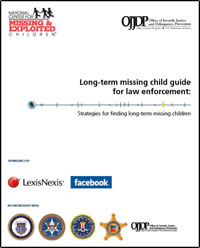 |
|
| Long-Term Missing Child Guide for Law Enforcement: Strategies for finding long-term missing children, edited by Robert G. Lowery, Jr., and Robert Hoever | |
Working with the media
Family liaisons may also help families navigate the media process. By being as involved as possible, law enforcement helps ensure families do not inadvertently and unknowingly compromise the investigation.
Family liaisons should:
- Help families establish clear, consistent messaging as well as practice delivery of that message.
- Help families understand they have the choice to say yes or no to media requests.
- Help families designate their media spokesperson. Since it may be beneficial to have one person speak on behalf of the family instead of several family members doing so, the family liaison may be instrumental in helping the family determine that person or a small group of people to publically speak on behalf of the family. And in doing so the media may respect that decision and lend more privacy to the family members not acting in this role.
- Keep families informed about upcoming press announcements and remain with them while viewing the event. In this process help families understand major media releases or announcements should come from someone with law enforcement authority such as the lead investigator or commander.
- Connect the family with the law enforcement agency’s public information officer.
- Ensure the family knows messaging is vital as the missing child and/or abductor could be hearing the information presented to the public.
When possible help guide families before they do their own press releases to help ensure this messaging is included.Assisting families with the media.
When a child is missing, media attention can be overwhelming. Many families have never interacted with reporters before and doing so can be a distressing experience. It is critical for the family liaison to provide families a better understanding of how the media works in these situations.
The family’s response can help shape coverage of the case. The law enforcement agency’s public information officer or PIO and family liaison can help provide a better understanding so the family can make appropriate decisions in the best interest of finding their missing child.
When a child first goes missing, media attention around the family can be intense with everyone wanting to talk to the family and neighbors. But when the child remains missing for an extended period of time, the opposite can happen ‒ media interest can decrease significantly. With any news story, there can be cycles of peak media interest. The same applies when the story is about a missing child.
As time passes and media interest subsides, families and law enforcement need to work harder to keep the story in the news. The family liaison can work with the family and PIO to develop a media strategy to keep media coverage as active as possible.
Any significant developments, such as important leads or items found during a physical search, new areas of interest and marker/anniversary dates as discussed in greater detail later in this chapter, can be points of media interest.
Because someone out there knows something, the goal of media is to reach and convince that person to call law enforcement with any information he or she may have.
It is important to remember the length of time a child will be missing is unknown. The family liaison can play an important role in preparing the family for a long-term situation, if such happens.
This includes sharing some basics about working with the media, which could be helpful for families whether it’s their first or 100th time interacting with reporters.
Basics law enforcement family liaisons should share with families they work with include:
- Some reporters are good at their jobs, and other reporters may not have the experience or knowledge to do their job while at the same time being sensitive to the situation and the family’s feelings.
- Always be prepared. It is important for families to know their message, practice it and deliver it well.
- All interviews with the family need to be controlled by the family. And family liaisons can reinforce this with every interview scheduled and attend as many as possible to help family members learn the best techniques to control interviews. This includes helping family members say no to interviews when they don’t want to take part.
- All media and public events in which the family participates should be coordinated with law enforcement.
Working together is vital to guide the public message and ensure the investigation is not compromised by information going public that needed to be concealed for investigative purposes.
It is important for family members to understand they always have a choice. Interviews can be emotional and draining. Families do not have to say yes to all media requests.
If they want to decline but would still like to get their message out to the public, they can ask another family member to help or appoint an appropriate spokesperson.
A family should do as much as they can to create public interest in the search for their child. Media publicity can be the best way to generate leads from the public concerning a missing child. It may even increase pressure and motivate an abductor to let the missing child go.
Don’t wait! Families and law enforcement should immediately work with the media.
Every minute is critical when a child is missing, and the family and law enforcement share a responsibility to get the word out as quickly as possible. The more sets of eyes looking for a missing child, the better the chances that child will be recovered.
Long-term missing cases
If the case becomes a long-term missing case, there are still things that can be done to help keep the media interested in covering the story.
For example certain types of information or developments can sometimes be released in separate announcements.
Consider doing this in order to stretch out news coverage over a longer period of time. Remember everything does not have to be released at once.
And different steps may happen at different times such as the institution of a reward for information related to the case. Since this may happen weeks, months or even years after the date the child was last seen, an announcement made at that later time could be used to try to generate renewed media interest.
The most important thing is to keep the missing child’s story in the public’s eye. Presenting the child’s story in a different way, makes it more likely to be used or aired by the media.
Checklist: Conducting Interviews With the Media
The most successful media interviews happen because of advance planning. If you know beforehand what points you want to get across, you are more likely to have a positive experience with the media. The following tips can help.
- Articulate the most crucial information in every interview.
Before you set up an interview, be sure you are ready. Be prepared to discuss information pertinent to the case—but be sure that law enforcement has been consulted about what information can be released and what should remain confidential.
Give essential information consistently to everyone in the media, especially the following items:
- Current pictures and videos of your child, in black and white, color, and digitized, if possible.
- A description of the clothing your child was wearing and of the items your child had in his or her possession, such as a book bag, backpack, or bicycle, along with identifying characteristics and personal traits.
- A telephone number for people to call in leads.
- Current pictures and videos of your child, in black and white, color, and digitized, if possible.
- Ask that your child’s picture be included in every interview you grant.
This is crucial because often the only thing that is clearly known is what your child looks like. Make sure that the picture given to the media resembles your child accurately and is suitable for distribution.
Always hold up a picture of your child during an interview and insist that his or her face be shown as part of the story. Ask radio stations to include a description of your child as part of their story.
- Limit the number of points you want to make and keep them simple.
Organize your thoughts and ideas, perhaps by writing them down, before you speak to an interviewer. Stay as calm and focused as you can.
Remember that you will be given a very small amount of airtime. That means that the more you say, the less control you will have over what portion of an interview the media will play.
- Try to cover the most important points first and to contain your answers to 10- to 20-second “sound bites.”
Short answers are more likely to be used than long, drawn-out answers. Also, if you try to cover too much, you may find that your most important points are left out of the story.
Remember, you don’t have to answer all of the questions. You can repeat your main points over and over again.
- Make your child real by sharing stories that show his or her wit, interests, and other endearing qualities.
If you personalize your plea by showing favorite toys, telling short anecdotes, and airing representative videotapes of your child, people are more apt to listen and remember and to feel they have a reason to care about your plight.
However, don’t loan any original items to the media because you may not get them back. Always label your child’s pictures, videos, and possessions.
- Keep control of the story.
Be prepared to field difficult questions. Although many reporters have families and will empathize with you, their job is to give the public an interesting story.
Some may appear to be skeptical of you — at least initially — because of well-publicized disappearances in which the parents turned out to be the culprits.
- Regardless of the questions asked, keep the story focused on your missing child.
If a reporter digs a skeleton out of your closet, don’t be afraid to say that a previous event has nothing to do with the present disappearance.
You may need to point out that members of the same family can be totally different in terms of behavior, academic performance, and emotional maturity.
- Be patient with reporters because many of them may be young and inexperienced.
It is difficult for someone who is not yet a parent to imagine what you are going through. If you are asked an inappropriate question, don’t answer it — and don’t explain why.
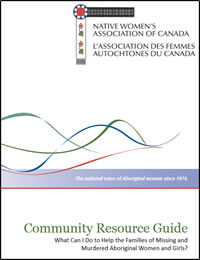 |
|
| Community Resource Guide: What Can I Do to Help the Families of Missing and Murdered Aboriginal Women and Girls?, by the Native Women's Association of Canada (NWAC) | |
Unlocking the Mystery of Media Relations
What Do I Need to Know?
Media relations can be a positive experience. Newspaper, radio, television and the Internet are excellent ways to communicate information.
If the media covers your story, thousands of people will read, hear or see your message, which will help raise awareness about missing and murdered Aboriginal women and girls in Canada.Preparation and poise are the two key attributes you need when working with the media. Be prepared for media attention at any time.
If you’re prepared, you are more likely to be relaxed and poised. You will be able to express your thoughts clearly and confidently.Wherever you are, please remember that you have rights! You have the right to say “yes” to an interview, for example, but you also have the right to say “no” or “this is not a good time for me.”
This is especially true for those of us who have personal connections to missing and murdered Aboriginal women and girls in Canada.
Each family or community deals with loss or grief in different ways, and it is unfair to assume that everyone is ready or willing to share their story. If you choose not to speak to the media, make your family and friends aware of your decision.
If you do agree to do an interview, remember that you are in control! You can decide when and where you meet or the best time for a reporter to call you.
You can ask for the questions ahead of time to prepare or decline if you don’t like the questions. You can also stop an interview at any time—either to collect your thoughts or to end the interview.
The Six Do’s of Media Relations
- Do ask questions. What is the purpose of the interview? What kind of questions does the reporter want to ask and how long will it take?
You may also find it helpful to write the questions down. Remember, you are in control!
- Do listen to what the reporter is asking. Keep your answers short and simple. Radio, for example, uses 5- to 10-second “sound bites,” and TV requires 15- to 20-second clips.
Newspapers need detail, detail, detail.
- Do take the time to answer a question again if you need to. If you make a mistake or flub an answer, don’t be afraid to go back and clarify your point.
- Do ask for clarification if you need it. If you don’t understand a question, ask the reporter to explain what he or she means. If you don’t have the answer or are not the right person to answer the question, say so.
You can always get back to him or her with an answer in a timely fashion, or have someone else answer the question on your behalf.
- Do keep calm and focused. Some reporters may be aggressive and rude, and may ask leading questions to spark an emotional response.
Be careful to keep your emotions in check so as not say something you may later regret. If a reporter is being too aggressive, you have the right to end the interview immediately.
- Do follow up. If a reporter is rude, misquotes you, or publishes or broadcasts incorrect information, call him or her for clarification, or file a complaint with the news assignment desk or news director.
Follow up your complaint or concern with a letter demanding a response.
Addendum for Families
How can I protect the reputation and character of a loved one in the media? This is the most common question people ask us regarding media relations in the context of missing and murdered Aboriginal women and girls in Canada.
Many families are hesitant to contact the media because they feel their message or story will be misused.We understand that this occurs and have prepared the following pointers to help you remain in control of your story, your message and the memory of your loved one.
- Discuss what type of relationship you want with any reporter. Will this be a one-time interview? Or is it important for you to be in regular contact with him or her?
You may also feel more comfortable if you always meet in person, or if the reporter spends some time with you and your family so that you get to know one another.
- Encourage the media to focus on the life and humanity of Aboriginal women and girls. Share childhood memories, for example, or the major accomplishments in your loved one’s life.
Remind reporters that your loved one is a daughter, sister, auntie, mother or grandmother. Focus on the fact that she is loved, will always be loved and is sorely missed.
Suggest that reporters use the name of your loved one as often as possible.
- Urge the media to steer clear of the usual negative stereotypes. Let reporters know whether certain terms or labels offend you and your family. The media can often portray Aboriginal women and girls as hopeless or troubled drifters.
Conversely, the media pay little attention to the lack of culturally specific services in cities, or to the way Aboriginal women and girls are targeted because of their gender and Aboriginal identity.
Remind reporters that NWAC staff members are available to provide historical background and context.
If a reporter is unwilling to be mindful of the way he or she presents Aboriginal women and girls, you have the right to end the interview.
- Ask the media to encourage discussion and reflection. Underscore the fact that Aboriginal women and girls in Canada should not be going missing or be murdered — that their human rights are being violated.
Canadians and the Canadian government are often outraged about this type of violence if it occurs in other countries. They should apply the same principle when an Aboriginal woman is targeted in Canada.
All these women are victims and did not deserve their fate. This is not just an Aboriginal issue; it is a Canadian issue.
You may ask reporters to repeat these messages back to you to ensure they understand what you are talking about.
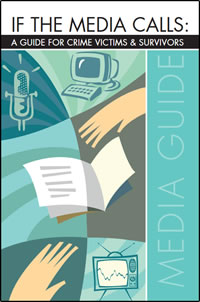 |
|
| If The Media Calls: A Guide for Crime Victims & Survivors, by the Canadian Resource Centre for Victims of Crim | |
This guide is intended to help crime victims and survivors work effectively and comfortably with the media (or to decline to do so).
Interacting with the media following victimization is a significant decision for crime victims as media exposure can positively or negatively impact their recovery process.
Contents:
- A Quick Guide: Things To Know
- Purpose of the Media Guide
- Breaking the News is What Matters
- The Media Focuses its Coverage on
- What to Expect From the Media
- Making Your Decision
- Possible Benefits of Sharing Your Story in the Media
- Possible Risks of Speaking Out in the Media
- Tips for Speaking With the Media
- Preparing for Interviews
- Demand Respect
- Saying No is Okay
- Conduction the Interview
- After the Interview
- What Types of Question Might the Media Ask?
- Technology & Social Media
- Conclusion
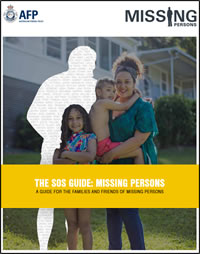 |
|
| The SOS Guide: Missing Persons — A Guide for the Families and Friends of Missing Persons, by the National Missing Persons Coordination Centre (NMPCC) | |
Using the media:
When using the media, it’s important you speak with your case officer or the Missing Persons Unit before you go ahead.
In the rare situation police advise against publicity, they will explain the reasons why. Likewise, police will speak with you prior to involving media as they will need to seek your consent.
Police will consider risk factors such as a missing person’s medical needs, grave concerns for their safety or welfare, age, or other vulnerabilities when determining whether the use of media is appropriate and may prove useful.
Police Media Units within each State and Territory will be able to help you prepare for a media interview, they will understand what details cannot be discussed as part of the ongoing investigation, and can stop interviews if you feel uncomfortable.
They will ensure media activity is coordinated (as there is likely to be several media requests), and they’ll ensure media activity undertaken has the greatest chance of success and supports the police investigation.
Developing a plan and deciding early what you are comfortable sharing may help to avoid unwanted media requests and intrusions. Before approaching media yourself, and after speaking with your case officer, consider:
- Who should talk to the media? A relative, friend, or family member; the case officer or police representative; and/or both.
- What type of information are you able to provide in order to avoid inadvertently hindering the investigation; be aware of the missing person’s privacy if they were to return; and think about personal details you may be asked and how to best approach them.
- Will you, or the media spokesperson, participate in an interview, or prepare a statement? Seek the advice of the Police Media Unit, who will be able to best direct you.
If the media directly approaches family or friends at home, there is no obligation to participate in media or provide your private contact details.
It is always recommended you contact your case officer for advice, and in such circumstances, you can provide them with the Police Media Unit’s contact details so they can manage requests on your behalf.
Likewise, if the media do not respect a request for privacy and become intrusive or disruptive, contact your case officer who may be able to assist.
What will the media ask?
When media approach family members, or close friends of a missing person, they do so in an attempt to add a ‘human’ element to the story. The more information you can provide them, the more likely they will get the story right.
The media will require basic information about the missing person including their name, age, a physical description, and their last known whereabouts. They’ll also need recent photographs (several) and any other imagery that will add to the story, particularly for print and television media.
In-depth media interviews — television features, magazines, print articles — will more than likely ask personal questions, such as:
- When did your loved one go missing?
- What were the circumstances?
- Can you tell us a bit more about him/her and what happened that day?
- What do you believe has happened to your loved one?
- How has this experience affected your family?
- How have you and other loved ones coped with the loss?
- What steps have the police taken in finding your loved one?
- What advice would you give to other people going through the same experience?
- What can the public do that might help you and your loved one?
- What would you say to your loved one if they were watching/listening?
Keep in mind there is no guarantee the media will run your story,
as it may compete with other news items on the day.Also consider seeking proactive media around anniversaries, birthdays, and special occasions such as Christmas. This will spark new interest in the case by both the media and the public, which can help in finding some answers.
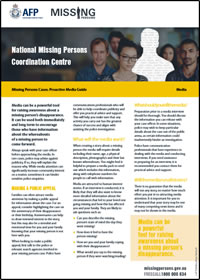 |
|
| Missing Persons Cases: Proactive Media Guide, by the National Missing Persons Coordination Centre (NMPCC) | |
Making a public appeal
Media can be a powerful tool for raising awareness about a missing person’s disappearance. It can be used both immediately and long term to encourage those who have information about the whereabouts of a missing person to come forward.
Always speak with your case officer before approaching the media. In rare cases, police may advise against publicity. If so, they will explain the reasons why. While media attention can significantly increase community interest on a matter, sometimes it can hinder sensitive police enquiries.
Families can often attract media attention by making a public appeal for information about the case. For an appeal, consider highlighting the case on the anniversary of their disappearance or their birthday. Anniversaries can help to draw renewed interest in the story, but this may also be a stressful and emotional time for you and your family knowing that your missing person is not here with you.
When looking to make a public appeal, first talk to the police or relevant search agencies involved in your missing persons case. Police have communications professionals who will be able to help coordinate publicity and offer you practical advice and support. This will help you make sure that any activity you carry out has the greatest chance of success and aligns with assisting the police investigation.
What will the media want?
When creating a story about a missing person the media will require details including their name, age, a physical description, photograph/s and their last known whereabouts. You might find it helpful to prepare a media pack to send out which includes this information, along with telephone numbers for people to call with information.
Media are attracted to human interest stories. If an interview is conducted, it is likely that they will also want to know more detailed information about the circumstances that led to your loved one going missing and how this has affected you and your family. They are likely to ask questions such as:
- Can you describe the missing person’s state of mind the day they went missing?
- How does it feel to have the person missing?
- How are you and your family coping with their disappearance?
- What would you say to the missing person if they were watching/reading?
What should you tell the media?
Preparation prior to a media interview should be thorough. You should discuss the information you can release with your case officer. In some situations, police may wish to keep particular details about the case out of the public arena, as certain information could inadvertently hinder an investigation.
Police have communication professionals that have experience in dealing with the media and conducting interviews. If you need assistance in preparing for an interview, it is recommended you contact them for practical advice and support.
Will the media run all stories?
There is no guarantee that the media will run any story, no matter how much effort you put in to attracting media attention. It is important for you to understand that your story may be one of many competing news items and it may not be shown in the media.
Media can be a powerful tool for raising awareness about a missing person’s disappearance.
 |
|
| Families of Missing Adults: Finding Help, by Ontario's Missing Adults (OMA) |
Read pages 10-13 to learn more about working with the media.
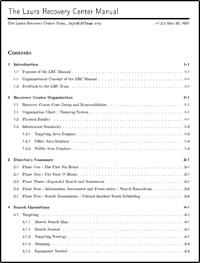 |
|
| The Laura Recovery Center Manual, by the Laura Recovery Center (LRC) Team |
Read pages 7.1 thru 7.4 for information on working with the media.
 |
|
| Missing: A Guide for Families and Friends of Individuals with a Mental Illness Who Have Gone Missing, by Christine Lafond, Stephanie Scherbain & Gita Sud, Mental Health Education Resource Centre of Manitoba |
Read pages 11-12 for more information on working with the media.
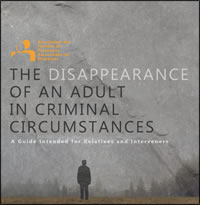 |
|
| The Disappearance of an Adult in Criminal Circumstances: A Guide Intended for Relatives and Interveners, by Justine Razafindramboa | |
Read page 14 for information on working with the media.
 |
|
| Someone is Missing: Can the Media Help You?, by Families and Friends of Missing Persons Unit, Victims Services, New South Wales, Department of Justice, Australia | |
How can I prepare myself for media involvement?
The media can be a powerful tool in raising awareness about a missing person at the initial reporting phase and throughout the investigation.
The media can help in locating missing people, particularly in the short-term.
For missing persons investigations reported to the police you will need to seek permission from the officer-in-charge before proceeding with media enquiries. Some investigations need to be conducted sensitively and media may not always be appropriate.
Media includes print, television, radio and internet exposure. A mix of these may assist in raising the profile of your case.
As a family member or friend of a missing person it is important to consider the following:
- What personal information you are willing to share and what you wish to remain private.
- Be clear about the details of the case – when and where was the missing person last seen as well as the salient details of the case.
- The questions you may be asked by the media – ask the reporter, prior to the interview, what questions they intend to ask.
- You might like to practice answering questions with someone, for example, Families and Friends of Missing Persons Unit (FFMPU).
- You can be assertive with the media, you are not compelled to answer every question asked.
- Media coverage can be draining; you may wish to organise a support person to attend interviews with you.
- Remember to seek details about media coverage, such as a media release date and whether or not you can have a copy.
- The contact details you will provide to the media. You might think about purchasing a prepaid SIM card for your mobile to ensure your privacy in the future. You need to be contactable so have a message service if you are unavailable.
- Where you would like the interview to take place? A neutral venue (for example, away from your home or office) might be more suitable.
- Setting boundaries but not placing unreasonable demands on journalists.
- Always be polite and never be hostile. Missing persons stories are time limited and your exposure may only be possible for short periods.
- Whether photos or video footage might benefit your story – it may personalise the investigation and your experiences.
- Seeking independent legal advice if you are asked to sign a consent form or exclusivity order.
What should I be sensitive to?
- You may be asked questions about what might have happened to a missing person. If you do not feel comfortable in talking about this it might be easier to answer ‘we just don’t know but we hope they are safe and well.
- Be conscious of the missing person and their privacy if they were to return. You may not want to provide information about the missing person’s place of work, health status, relationships or financial situation.
- Questions about a missing persons mental health might also be asked. If you do not want to talk about their mental health you might like to answer ‘the missing person requires regular medication’ rather than the details of diagnosis.
- Other family members or friends might not believe that the media should be involved. It is difficult to ensure that everyone’s wishes are respected. You can seek support from the FFMPU to generate some family discussion prior to you proceeding with media.
- Media outlets may keep records of your interviews or images of the missing person. Once the information is in the public domain it is difficult to control its use.
How can I get the media interested?
Following approval for media from the relevant police jurisdiction you may decide to do the following:
- request that the police make enquiries about media opportunities
- raise your request with the Families and Friends of Missing Persons Unit who will liaise with the Department of Justice and Attorney General media spokesperson
- contact the National Missing Persons Coordination Centre, Australian Federal Police and request inclusion on their family media bank
- contact media outlets directly
- circulate an email and ask that people send it on within their networks
- start an electronic blog to generate publicity amongst internet communities (blogs can be set up free of charge via www.blogspot.com).
| << Prior Chapter | Next Chapter >> |
People who say it cannot be done,
should not interrupt those who are doing it.
— Author unknown

If you've been able to read this
Web page...
thank a Teacher;
If you've been able to read this
Web page in English...
thank a Veteran.
— Author unknown
Copyright © 1984-
March 23, 2021
by Michael A. Neiger
Contact Michael Neiger via e-mail at mneiger@hotmail.com
Top
You're here: MibSAR :: M-P Sourcebook Table of Contents :: Media